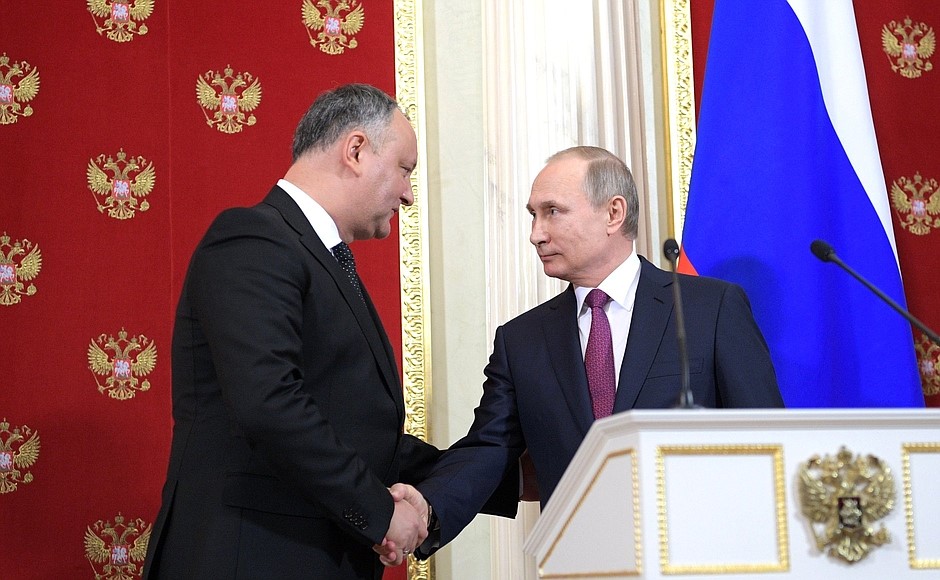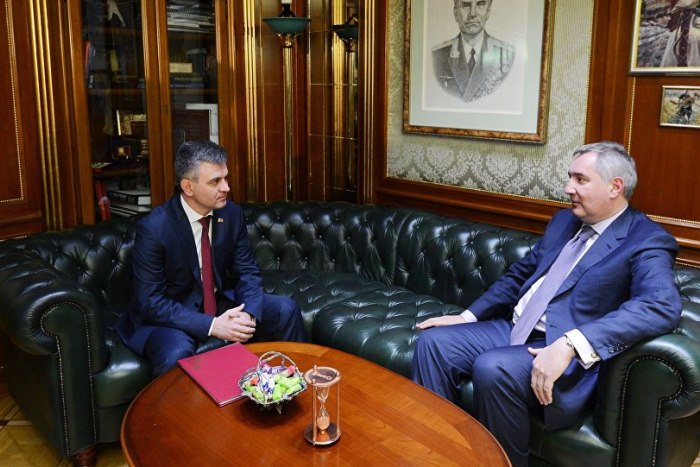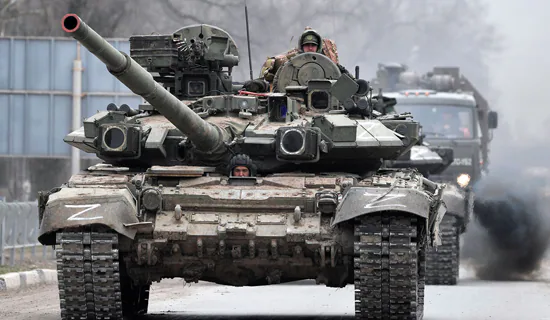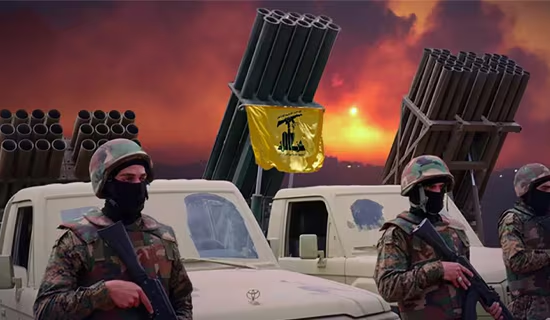Russian Deputy Prime Minister Dmitry Rogozin is persona non grata in Moldova. Rogozin, who is Russian President’s Special Representative for Transnistria and a co-chairman of the Russian-Moldovan intergovernmental commission, was set to visit Moldova and the breakaway region of Transnistria on July 28, at the invitation of Moldova’s pro-Russian President, Igor Dodon, in order to participate to the 25th anniversary of the Russian peacekeeping force's deployment on the Dniester River, after a conflict that ended in 1992. Rogozin and Dodon were supposed to mark the 25th anniversary together with the separatist President of Transnistria Vadim Krasnoselsky.
However, Rogozin's visit to Moldova was disrupted, since Romania refused to allow the Russian S7 plane with a Russian delegation on board and over 160 passengers on board to enter its airspace. As reported in the Russian media, the S7 aircraft company reported that the air-traffic management service had denied the plane entry into Romanian airspace, citing the EU-imposed travel-ban on Rogozin, following the Ukrainian crisis. Hungary, like Romanian an EU member, also denied the plane passage through its airspace or landing in Budapest. The plane then diverted to Minsk, and from there Rogozin flew back to Moscow.
On July 30, Rogozin announced that the Romanian Minister of Foreign Affairs Teodor Viorel Meleșcanu had originally planned a flight route with a probable stopover in Moscow, but had to change his plans and route in order to avoid transiting in the Russian airspace.[1]
On August 2, Rogozin was declared persona non grata by the pro-Western Moldovan government,[2] after the Russian deputy PM said during an interview with the Russia 24 channel, that the Moldovan government delegation, which had visited Russia half of year ago, behaved like "gypsies." Rogozin said: "The [Moldovan] negotiators were like gypsies, they talked about all the problems: transit, immigrants, export of apples and wines. Nevertheless, when we touched on important issues, they hid like mice."[3] Moldova's Speaker of Parliament Andrian Candu attempted to clarify that the measure taken targeted Rogozin specifically: "We always respect the international relations we have with all countries, including Russia… Today’s actions do not target Russia or its citizens, but [they are aimed] against one person."[4]
Meanwhile, Moldovan MPs are also contemplating the introduction of visas for Russian citizens, but no specific proposals are currently on the table. Moldova's President Dodon blasted the very idea of visa requirements for Russian citizens: "I can see no reasons for Moldova [to introduce visas], particularly when more than 560,000 of our nationals are in the Russian Federation."[5]

(Source: Twitter.com/flightradar24, July 28, 2017)

Dmitry Rogozin (Source: Digi24.ro)
Moldovan Government's Statement: 'The Biased Attitude And The Likings Of The Russian Peacekeepers For The Breakaway Tiraspol Regime Are Absolutely Obvious'
On the eve of 25 anniversary of a peacekeeping operation in Transnistria, the Moldavian government issued a statement that addressed Russia-Moldova relations and questioned the motives the Russian peacekeeping force Transnistria:
"The 25th anniversary of the signing of the AGREEMENT on the principles of peaceful settlement of the armed conflict from Moldova’s Transnistrian region by the then presidents of Moldova and Russia was marked on 21 July.
"The retrospective assessment of the political importance of this act is incontestable: it put an end to an armed conflict and bloodsheds, thus making the life of the ordinary people from the two banks of Dniester prevail. Bringing our deep homage to all those who lost their lives for the defense of the independence, sovereignty and territorial integrity of Moldova, as well as to all those who remained alive in the wake of the spring-summer 1992 hostilities at Dniester, looking at the situation from the perspective of the present days, we can understand even better the price we had to pay for our freedom and for the peace to return again to our land and homes. This is the most valuable lesson we learned from the tragic events we experienced in 1992.
"At the same time, we have to recognize, regretfully, the fact that many other goals put down in the 1992 Agreement just remained a dead letter. The saddest ascertaining in this respect is the fact that our country has to face, in continuation, a breakaway conflict, which represents a serious obstacle to the further development of our society, generating, at the same time, a multitude of problems and difficulties for the ordinary people from both banks of Dniester. The efforts undertaken during this quarter of century, which has passed, to peacefully settle this conflict within different formats of talks, based on the observance of Moldova’s sovereignty and territorial integrity and the free choosing of its development way, have not yielded the results expected. Or, the main reason of this political failure must be sought, first of all, in the geopolitical interests and the historical stereotypes of the Russian Federation, which, to all appearances, is in continuation in process of looking for a civilized model of edifying its relations with Moldova, based on mutual respect, non-interference with the domestic affairs and other generally recognized fundamental principles of the international law.
"We appreciate the positive contribution of the peacekeeping operation, carried out at Dniester in late July 1992, within which the military contingent of Russia played a decisive role in separating the forces engaged in war, to the observance of the ceasefire regime and the maintenance of relative peace in the Security Zone. As time passed, however, we had to find out the fact that this operation failed to ensure the full demilitarization of the Security Zone and remove all obstacles to the free movement of people, goods and services between the two banks of Dniester, just as it was provided for in the Moldovan Russian-Agreement from 1992. Moreover, the concerned peacekeeping operation, glorified by some people, has turned into a factor of conservation of the Transnistrian conflict, or the biased attitude and the likings of the Russian peacekeepers for the breakaway Tiraspol regime are absolutely obvious. Namely for this reason, the Moldovan authorities started demanding, for a long time, legitimately and naturally, the transformation of this operation into a multinational civilian mission with international mandate, being firmly confident that this fact will contribute to the strengthening of trust and creation of a friendlier atmosphere for carrying out the process of negotiations on identifying a viable solution to the Transnistrian problem. Or, just as we see it well, Chisinau’s voice has not been heard, not to say that it was ignored.
"In the same context, we have to remind, bitterly, one more important stipulation of the 1992 Agreement and namely the one dealing with the commitment of the Russian Federation’s military forces (the former 14th army deployed in the region) to strictly observe the principle of neutrality in relation to the two conflicting sides. What neutrality one could speak about when we all see how, in the last period, the Russian troops have been holding military exercises jointly with the power wielding forces of the Tiraspol regime, including by forcing the Dniester river. Moreover, Russia’s leadership took the commitment to negotiate with Moldova an agreement on the status, way and terms of the withdrawal of its military formations from Moldova’s territory. The concerned agreement, which was negotiated during two years and signed on 21 October 1994, also remained dead letter, because of the Russian side’s refusal to enforce it.
"As a result of concerted political and diplomatic efforts, at the summit of OSCE and the one of the states parties to the Conventional Armed Forces in Europe Treaty, held in Istanbul on 18-19 November 1999, pertinent decisions were adopted on the Russian Federation’s commitment to withdraw its troops and ammunitions from Moldova’s territory, the commitment which, just as it is well-known, was forgotten by this country too. Despite these unfriendly circumstances, the Moldovan authorities have spoken out and will further speak out consistently for the withdrawal of the Russian troops and ammunitions illegally deployed on the territory of our country, with the violation of the provisions of Moldova’s Constitution and the generally accepted fundamental principles of the international law. In these circumstances, Russia’s pretentions to be an impartial mediator and guarantor of the understandings agreed within the process of negotiations on the Transnistrian conflict settlement sound queerly, taking into account its refusal to fulfill its own commitments.
"Russia’s intentions to solemnly mark the 25th anniversary of the holding of the present peacekeeping operation are perceived in the same way. Or, in the lack of a plan of joint actions, occasioned by this event, the carrying out of such actions unilaterally is able to harm the relations between the two countries, which Moldova wants to be friendly and of mutual respect. Such 'holiday' actions, the unfriendly spirit of which is well-felt, might negatively affect the further holding of the process of talks on the peaceful settlement of the Transnistrian problem, based on the observance of the sovereignty and territorial integrity of Moldova, with the adoption of a special legal status for Transnistria.
"In the light of the aforementioned, we must recognize the fact that, for us, the 25th anniversary of the end of the tragic events at Dniester from 1992 represents rather a 'holiday with tears in eyes', just as a famous song puts it. We believe that we should render justice to those who consider that, to mark this event, it would be more properly to lower flags to half-mast."
(Gov.md, July 28, 2017)
Rogozin replied to the Moldavian government's statement in an interview to the Russia-1 channel:
"Let me remind you that there [in Transnistria] live 500 thousand people, 200 thousand of whom are our citizens Russian citizenship. Taking advantage of this opportunity, I want to tell you, that even if one single hair should fall from a Russian citizen's head [there], then [our] response will be extremely harsh."
(Gazeta.ru, July 29, 2017)
It should be noted that Russia used the pretext of defending Russian citizens and Russian speakers to justify its annexation of Crimea in 2014 and its 2008 war with Georgia.

Anti-Rogozin protest in Moldova's capital Chisinau sign reads: Rogozin go home and take Dodon with you (Source: Euromaidanpress)
Rogozin: The West Is Behind Those Provocations
After the diplomatic incident, Rogozin wrote in his Twitter account:
"The Romanian authorities jeopardized the lives of regular S7 jet passengers, women and children. We barely had enough fuel to get to Minsk. Await a response you, scumbags."
(Twitter.com/Rogozin)
He then comments on his Facebook account: "The things that are happening in our relations with the West (namely, it is only the WEST, that is behind all those provocations by Romanian-Moldavian lackeys) are objective and inevitable. The confrontation will only get fiercer. If there was no Crimea, they would find anything else to haunt us. They were quite satisfied with the alcohol-intoxicated Russia of the 90s, and they would never make peace with our desire to be free and strong. The best response for all those sanctions is to be the things we want to be – free and strong. We'll decide how to 'tear up the ears' of those insignificant debauchees during regular working session [meaning without paying too much attention].
(Facebook.com/dmitry.rogozin/)
Rogozin then decided to delete his comments on Facebook and on Twitter. Commenting on his posts, Rogozin wrote on Facebook: "The sharp tonality of my utterances reflects my emotions…over what happened to the passengers on our flight." He then added: "Most of them were returning home. I always traveled to Moldova by regular flights of Russian airlines. The shameful stunt of the Romanians and the Moldovan government requires careful analysis and precisely calculated stinging countermeasures."
(Tass.com, July 29, 2017)

(Source: Vk.com/politics_today)
Rogozin: Russia Will Take Retaliatory Measures
In an interview with Russia 24 TV channel Rogozin declared that Russia will take measures against those who decided to ban the Russian plane, in which he was flying. Rogozin said: "There will be a response, of course. It, of course, will not be as emotional as the first reaction. We will determine who was behind these decisions in Chisinau, Bucharest, Budapest and Brussels. We will determine the people who took these decisions. Our sanctions will be measured and targeted." He then stated that sanctions would be applied "when there will be suitable time and place," adding that Russia "knows how to respond."
(Tass.com, July 29, 2017)
Rogozin: Romania Is A U.S. Puppet
In the same interview on Russia 24 TV channel, Rogozin said: "This is a direct provocation that was hard to be predicted, as the route was a frequently used one… They have threatened the flight of a civil plane (and there are no other variants of flying there: charter flights are not admitted there, military flights are not admitted there either). They made this provocation not only against me, but also against Moldovan citizens who flew with me by plane… I have flown to Transnistria five or six times as a special presidential representative by civil aircraft companies… Sanctions are illegal in themselves, but Romania itself stated last year that it did not see any hindrances for people included in sanctions lists flying by its airspace."
Rogozin then added: "This is part of a major provocation and escalation of tensions that we see here… This is, first, a mafia group that stands behind Moldova's government and that understands that it has serious problems with the law and so it needed to be in line with the West. That is, it stood behind the organization of provocations against our performers and peacemakers who were going to the anniversary of the Dniester peacekeeping operation."
At another point, Rogozin stated that Romania "became an apparent puppet of the U.S." The deputy prime minister noted that, while he was serving as Russian ambassador to NATO, he observed that Romanian policy makers are "one of the best instigators of all anti-Russian campaigns, together with the Balts and the Brits. So, this is what could be expected from them."
(Tass.com, July 29, 2017)
During the interview, he also stated: "There will be elections in Moldova and if sober-minded forces win them, we will be able to correct this situation. At this point, we have to be in this situation maintaining fragile peace, protecting our rights of the peacekeeping mission participant in order that no conflict emerged."
(Novostipmr.com, July 30, 2017)
MP Oleg Nilov: The Moldavian Government Is Romania's Puppet
Just Russia MP Oleg Nilov, deputy fraction leader, said that the incident proves that "the Moldavian government is a puppet in the hands of Romania. Thus the retaliatory measure should be taken against Romania." He then added: "We should start by summoning the Romanian ambassador to our MFA to provide explanations and review the situation so the Russian side can have satisfaction. Until it's done all the planes heading from Romania to our country should be turned around just as was done with the Russian jet."
Rodina MP Alexey Zhuravlev said: "I've suggested expelling the [Romanian] ambassador. Romania, on the other hand, is not an isolated country – and we do have our own allies. Do they [Romanians] really want us to ban any transit for their officials through all the countries we have ties to? This is quite a real thing to do… They all are afraid of only one thing – they are all afraid of real force and threat. We should quit all the agreements regarding nuclear weapons, with no exceptions. Might be, then they'll start to grasp the point."
(Ria.ru, July 29, 2017)
Pro-Russian Moldovan President Dodon: 'These Actions Are Geared Against Cooperation With Our Strategic Partner'
Pro-Russian Moldovan President Igor Dodon criticized the pro-West Moldova's government, which opposes him. Dodon said: "These actions are geared against cooperation with our strategic partner [i.e. Russia], which has been normalizing after the meeting between the Moldovan and Russian presidents, and against the settlement of the Transnistrian problem and restoring Moldova's territorial integrity, where some progress has just been reached."
(Tass.com, July 28, 2017)

Dodon with Putin (Source: Kremlin.ru, January 17, 2017)
On August 5, it was reported that Dodon and Rogozin held a meeting in Tehran to discuss measures for preventing the further deterioration of bilateral relations between Moldova and Russia. In a phone interview with the Russian news agency TASS, Dodon said: "We discussed the measures that need to be taken to prevent any further deterioration in bilateral relations following the recent decision made by the [Moldavan] government [to declare Rogozin persona non grata], as well as the situation surrounding Transnistria… It was a constructive meeting… I asked our Russian counterparts to refrain from taking retaliatory steps and imposing sanctions which could damage the interests of companies and ordinary citizens… I would like to stress that I intend to continue cooperating with Dmitry Olegovich [Rogozin], who is the Russian President’s Special Representative for Transnistria and a co-chairman of the Russian-Moldovan intergovernmental commission."
Dodon also added that the Moldavan government’s actions against Rogozin are unacceptable, as "polls show that more than 65% of Moldova’s citizens consider Russia to be a friendly state." Dodon said: "As president, I intend to defend the interests of the Moldovan people and use every legal tool to counter the ruling party’s attempts to destroy our relations with Russia, even by boycotting bills passed by the parliament."
(Source: Tass.com, August 5, 2017)
On August 14, TASS reported that Dodon will meet with Russian President Vladimir Putin in October, on the sidelines of the CIS summit. In that occasion, Dodon stated that he will discuss decision made by Moldova’s government to declare Rogozin persona non grata. "I hope that I will have an opportunity to discuss this issue before the summit. I will request Russia to refrain from taking retaliatory measures that would deliver a blow to ordinary citizens as they should not be held responsible for the actions taken by the parliamentary majority that dreams of pleasing the Americans or someone else," Dodon stated.
(Tass.com, August 14, 2017)
Transnistria's President Krasnoselsky Meets Rogozin In Moscow
Transnistria's head of state Vadim Krasnoselsky said that the disruption of Rogozin's visit to Moldova is "a scandalous thing." According to Krasnoselsky, no one has the right to restrain Russian citizens' freedom of movement in Moldova.[6] On August 2, Krasnoselsky met with Rogozin in Moscow, to discuss economic support to Transnistria.[7]

Krasnoselsky with Rogozin (Source: Novostipmr.com)
Rogozin Warns About Escalation in Transnistria
During an interview with Russia-1 TV channel, Rogozin was asked whether the dispute with the Moldovan government will deteriorate the situation in Transnistria. Rogozin answered: "We are worried over that most of all… We have a military contingent there, which guards munitions depots of the former 14th Soviet army. Second, we have about 450 peacekeepers there… Now, the Moldovan authorities and security agencies are seeking to deprive us of the possibility to rotate our peacekeepers, whose term of service is expiring and who are to return home. Moldovan authorities stop Russian officials. It is a subject matter for a very tough talk and it looks like we will have these talks neither with Bucharest nor with Chisinau. We will speak with those who are pulling these strings."
(Tass.com, August 6, 2017)
Russian Foreign Ministry: This Incident Is A Deliberate Provocation That Seriously Undermines Russian-Romanian Relations
The Russian Foreign Ministry published the following communiqué:
"On July 28, the Russian Foreign Ministry made a protest to the Romanian Charge d'Affaires ad interim in Russia, Viorel Cojocaru, over the Romanian authorities' blocking of a civil passenger jet of the air carrier Globus, performing a regular Moscow-Chisinau flight on July 28, from entering the country's airspace.
"It was emphasized that the move endangered the safety of the over 160 passengers on board, who failed to arrive at their destination on time.
"These actions prevented Russian Deputy Prime Minister Dmitry Rogozin and accompanying individuals from arriving in Chisinau to meet with Moldovan President Igor Dodon and take part in events marking the 25th anniversary of the start of the peacekeeping operation in Transnistria.
"Moscow views this incident as a deliberate provocation that seriously undermines Russian-Romanian relations.
"We have called on the Romanian authorities to conduct a thorough investigation into the incident and provide an explanation."
(Mid.ru, July 28, 2017)
Deputy FM Karasin: The Decision To Declare Rogozin Persona Non Grata Is Perfidy
In an interview with Russian newspaper Kommersant, State Secretary and Deputy Foreign Minister Grigory Karasin, Grigory Karasin, was asked about Russia-Moldova relations. Karasin was interviewed after his meeting Moldova's Ambassador to Russia Andrei Neguta, on August 2. Karasin expressed a firm protest against the Moldovan Government's decision to declare Rogozin a persona non-grata.
Q: "And today, the Government of Moldova declared Dmitry Rogozin persona non-grata."
Grigory Karasin: "There is no way to call this new decision other than perfidy. In fact, it is aimed at annihilating all the achievements of the previous years. It targets not only a high-profile Russian political figure, but is also a blow to our relations, the peacekeepers and the interests of people in both countries. This is a matter of legitimate concern for us."
Q: "What will be the consequences of this decision?"
Grigory Karasin: "We believe that these actions are a blow to bilateral relations. They are aimed at destabilizing the region and perhaps Europe as a whole.
"This is confirmed by the reckless calls to review the existing agreements regarding the peacekeeping operation in Transnistria without taking into consideration what Transnistrians think about it and without involving international formats.
"I think that this should be a matter of concern for the European capitals too, since this could result in a new hotbed of tension in Europe. This is something foreign ministries and other agencies in Europe should understand.
"This is not what we wanted. Russia very much regrets and expresses its disappointment over Chisinau's attempts to join the right flank of anti-Russia campaigns that are actively promoted a present."
Q: "Can Moscow be expected to introduce sanctions against Chisinau or Bucharest?"
Grigory Karasin: "We follow a measured approach and are less emotional in our actions compared to some foreign actors. We will not be in a hurry to take any such steps. That said, there will undoubtedly be an adequate response to these actions."
(Mid.ru, August 2, 2017)




